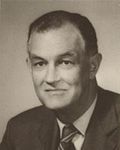November 6, 1973 | |||||||||||||||||
| |||||||||||||||||
 County and independent city results Godwin: 50–60% 60–70% 70–80% Howell: 50–60% 60–70% 70–80% | |||||||||||||||||
| |||||||||||||||||
| Elections in Virginia |
|---|
 |
In the 1973 Virginia gubernatorial election, incumbent Governor A. Linwood Holton, Jr., a Republican, was unable to seek re-election due to term limits. Mills E. Godwin, Jr., former Democratic Governor of Virginia, was nominated by the Republican Party to run against Independent Lieutenant Governor of Virginia Henry Howell. The Democrats did not field a candidate, mostly choosing to support Howell's candidacy.
Contents
This was the last time until 2013 in which a member of the incumbent President's party was elected Governor of Virginia. It was also the last time a non-Democrat won the city of Alexandria.

